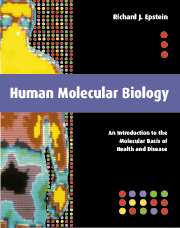Book contents
- Frontmatter
- Contents
- Preface
- Acknowledgements
- Read me first …
- Glossary
- Dedication
- Introduction: A disease for every gene?
- I From molecular biology to human genetics
- II From molecular genetics to human biochemistry
- III From molecular biochemistry to human cell biology
- IV From molecular cell biology to human physiology
- 16 Development
- 17 Metabolism
- 18 Blood
- 19 Immunity
- 20 Neurobiology
- V From molecular physiology to human molecular biology
- Index
19 - Immunity
Published online by Cambridge University Press: 01 June 2011
- Frontmatter
- Contents
- Preface
- Acknowledgements
- Read me first …
- Glossary
- Dedication
- Introduction: A disease for every gene?
- I From molecular biology to human genetics
- II From molecular genetics to human biochemistry
- III From molecular biochemistry to human cell biology
- IV From molecular cell biology to human physiology
- 16 Development
- 17 Metabolism
- 18 Blood
- 19 Immunity
- 20 Neurobiology
- V From molecular physiology to human molecular biology
- Index
Summary
Antibody function
The basic structure of antigen receptors and their accessory molecules is discussed elsewhere (pp. 198–208). In the following section we consider the functional correlates of antigen receptor structure in human lymphoid cells.
Immunoglobulin specificity derives from V(D)J exon variation
Biological systems exploit variability. Bacteria and viruses, for example, use genetic variability to acquire resistance to host defense mechanisms. The human immune system deploys similar strategies to counter the threat posed by these noxious moving targets. There are two main mechanisms by which immunocytes generate antibody diversity:
1. Germline V(D)J recombination.
2. Somatic hypermutation.
Immunoglobulins are multisubunit proteins consisting of two heavy chains (each containing about 440 amino acids) and two light chains (each about half the size of a heavy chain). These subunits are encoded by genes at three loci: the κ light chain locus on chromosome 2; the λ light chain locus on chromosome 22; and the heavy chain locus on chromosome 14. Transcription of these genes is controlled by transactivating molecules that bind enhancers present within the respective genomic DNA sequences.
Light chains consist of constant (C), variable (V), and joining (J) domains, whereas heavy chains contain an additional diversity (D) chain. The tremendous range of immunoglobulin variation arises due to V(D)J exon recombination within these latter gene loci. As the name suggests, the constant (C) domain does not undergo recombinational modification.
- Type
- Chapter
- Information
- Human Molecular BiologyAn Introduction to the Molecular Basis of Health and Disease, pp. 473 - 490Publisher: Cambridge University PressPrint publication year: 2002



